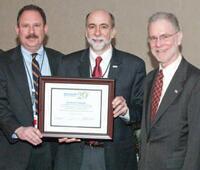Raytheon
April 5, 2010
Raytheon Recognized for Environmental Leadership
Toxics use reduction now integral to all business operations
Andover, Mass. – At a ceremony today, representatives of the Toxics Use Reduction Act (TURA) Program and state legislators presented Raytheon Company with an award to acknowledge the company’s environmental leadership in Massachusetts.
The company that employs over 12,000 people in the state is one of 17 companies across the Commonwealth being recognized by the Toxics Use Reduction Act (TURA) Program as a “TURA 20th Anniversary Leader.” The awards and facility tours are intended to showcase environmental accomplishments—use of safer materials, waste reductions and energy savings—since the Toxics Use Reduction Act was enacted in 1989.
“We selected Raytheon for its stellar record of contribution and achievement in greening its processes and products,” said Janet Clark, senior associate director of the Toxics Use Reduction Institute at UMass Lowell. “With a foundation of energy management initiatives from the 1970’s, Raytheon embraced toxic use reduction from day one of the law—and has consistently shared findings and methodologies so more companies can benefit.”
Innovative thinking has been at the core of Raytheon’s environmental initiatives
Innovative thinking has been at the core of Raytheon’s environmental initiatives, such as the decision to centralize chemical storage with a just-in-time use model that has increased efficiency and safety across 50 of Raytheon’s major manufacturing locations. Based on a pilot program in Andover, central chemical management gives third-party suppliers financial incentives to recommend safer products and more efficient usage.
“Our work with the TURA program was the catalyst for integrating toxic use reduction into all of our business operations,” said Frank Marino, senior manager of corporate environmental, health and safety at Raytheon. “Doing what is right for the environment—and therefore right for our company, employees and the community—is now standard business practice.”
With a broad view of the impact of its production processes and products, Raytheon has concentrated efforts on eliminating ozone-depleting solvents, lead, cadmium and hexavalent chromium. Work to reduce greenhouse gas emissions resulted in 275,000 metric tons of GHG emissions avoided between 2002 and 2008—achieved a year ahead of a self-imposed 2009 EPA Climate Leaders goal. The company has now set a new EPA Climate Leaders goal of an absolute 10% reduction of GHG emissions by 2015.
While the Toxics Use Reduction Act was expanded in 2006 to include conserving water and energy use, Raytheon has had an energy management program in place since the early 1970’s. The company invested in high efficiency lighting, premium efficiency motors and parts, state-of-the-art automated energy management and control systems and a pilot solar photovoltaic system.
The Toxics Use Reduction Act does not ban chemical use but requires companies to evaluate toxic chemical use, submit usage reports and as well as plans to the state that assess the financial implications of switching to safer alternatives or making changes in production. Since 1989, Massachusetts companies voluntarily reduced toxic chemical use by 41 percent, waste by 71 percent and on-site releases by 91 percent.
About the Toxics Use Reduction Act Program
Twenty years ago, the Massachusetts legislature passed landmark legislation—the Toxics Use Reduction Act (TURA). Today, the TURA Program is considered a model environmental policy by other states and countries. The three agencies below have provided training, grants, technical assistance and support to help companies reduce toxic chemical use and costs, improve health and safety and establish new green markets.
- Toxics Use Reduction Institute (TURI) at the University of Massachusetts Lowell. Provides education, training, and grants for Massachusetts industry and communities; sponsors research and demonstration sites on safer materials and technologies; provides policy analysis; and manages the TURA Science Advisory Board.
- Office of Technical Assistance & Technology (OTA). A non-regulatory agency within the Executive Office of Energy and Environmental Affairs that provides free, confidential, on-site technical and compliance consultations to Massachusetts businesses and institutions.
- Massachusetts Department of Environmental Protection (MassDEP). Certifies Toxics Use Reduction (TUR) Planners, receives and reviews toxics use reports submitted by companies, provides guidance, takes enforcement actions, and collects chemical use data and makes it available to the public.
